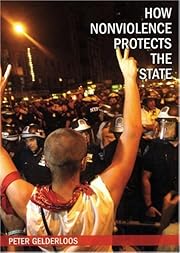

Clique em uma foto para ir ao Google Livros
|
Carregando... How Nonviolence Protects the State (2007)de Peter Gelderloos

South End Press (14) Ainda não há conversas na Discussão sobre este livro.   ) )Though it won’t necessarily cause you to pick up a Molotov cocktail or an AK-47, this little book will cause you to at least question some of your assumptions about past successes from nonviolence movements. From Gandhi to MLK to the anti-Vietnam movement, there have always been more militant groups working at the same time. These more militant groups through either actual violent acts or through the threat of violence may have done as much to change policy as the nonviolent groups that we feel more comfortable focusing on. Plus as an added bonus, we guarantee an FBI file to be created with every purchase! In his book How Nonviolence Protects the State, anarchist Peter Gelderloos criticizes nonviolence as being ineffective, racist, statist, patriarchal, tactically and strategical inferior to militant activism, and deluded. Gelderloos claims that traditional histories whitewash the impact of nonviolence, ignoring the involvement of militants in such movements as the Indian independence movement and the Civil Rights movement and falsely showing Gandhi and King as being their respective movements' most successful activists. He further argues that nonviolence is generally advocated by privileged white people who expect "oppressed people, many of whom are people of color, to suffer patiently under an inconceivably greater violence, until such time as the Great White Father is swayed by the movement's demands or the pacifists achieve that legendary 'critical mass.'" sem resenhas | adicionar uma resenha
Since the civil rights era, the doctrine of nonviolence has enjoyed near-universal acceptance by the US Left. Today protest is often shaped by cooperation with state authorities-even organizers of rallies against police brutality apply for police permits, and anti-imperialists usually stop short of supporting self-defense and armed resistance. How Nonviolence Protects the State challenges the belief that nonviolence is the only way to fight for a better world. In a call bound to stir controversy and lively debate, Peter Gelderloos invites activists to consider diverse tactics, passionately arguing that exclusive nonviolence often acts to reinforce the same structures of oppression that activists seek to overthrow. Contemporary movements for social change face plenty of difficult questions, but sometimes matters of strategy and tactics receive low priority. Many North American activists fail to scrutinize the role of nonviolence, never posing essential questions: Is nonviolence effective at ending systems of oppression? Does nonviolence intersect with white privilege and the dominance of North over South? How does pacifism reinforce the same power dynamic as patriarchy? Ultimately, does nonviolence protect the state? Peter Gelderloos is a radical community organizer. He is the author of Consensus: A New Handbook for Grassroots Political, Social, and Environmental Groups and a contributor to Letters From Young Activists. He is the co-facilitator of a workshop on the prison system, and is also involved in independent media, copwatching, anti-oppression work, and anarchist organizing. Não foram encontradas descrições de bibliotecas. |
Current DiscussionsNenhum(a)Capas populares
 Google Books — Carregando... Google Books — Carregando...GênerosClassificação decimal de Dewey (CDD)303.6Social sciences Social Sciences; Sociology and anthropology Social Processes Conflict and conflict resolution ; ViolenceClassificação da Biblioteca do Congresso dos E.U.A. (LCC)AvaliaçãoMédia: (3.9) (3.9)
É você?Torne-se um autor do LibraryThing. |
||||||||||||||||||||||||||||||||||||||||||||||||||||||||||||||||||||||||||||||||||||||||||||||||||||||||||||||||||||||||